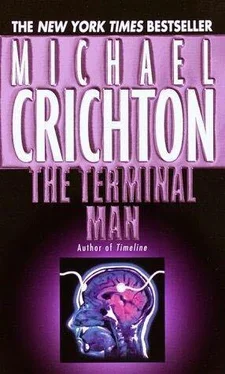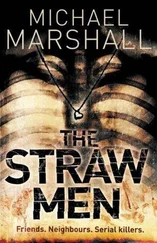Michael Crichton - The Terminal Man
Здесь есть возможность читать онлайн «Michael Crichton - The Terminal Man» весь текст электронной книги совершенно бесплатно (целиком полную версию без сокращений). В некоторых случаях можно слушать аудио, скачать через торрент в формате fb2 и присутствует краткое содержание. Жанр: Фантастика и фэнтези, на английском языке. Описание произведения, (предисловие) а так же отзывы посетителей доступны на портале библиотеки ЛибКат.
- Название:The Terminal Man
- Автор:
- Жанр:
- Год:неизвестен
- ISBN:нет данных
- Рейтинг книги:3 / 5. Голосов: 1
-
Избранное:Добавить в избранное
- Отзывы:
-
Ваша оценка:
- 60
- 1
- 2
- 3
- 4
- 5
The Terminal Man: краткое содержание, описание и аннотация
Предлагаем к чтению аннотацию, описание, краткое содержание или предисловие (зависит от того, что написал сам автор книги «The Terminal Man»). Если вы не нашли необходимую информацию о книге — напишите в комментариях, мы постараемся отыскать её.
The Terminal Man — читать онлайн бесплатно полную книгу (весь текст) целиком
Ниже представлен текст книги, разбитый по страницам. Система сохранения места последней прочитанной страницы, позволяет с удобством читать онлайн бесплатно книгу «The Terminal Man», без необходимости каждый раз заново искать на чём Вы остановились. Поставьте закладку, и сможете в любой момент перейти на страницу, на которой закончили чтение.
Интервал:
Закладка:
There had been a time when he regarded the little gray box clipped to his belt as a wonderful thing. He relished those moments when he would be having lunch or dinner with a girl and his pagemaster would go off, requiring him to call in. That sound demonstrated that he was a busy, responsible person involved in life-and-death matters. When the pagemaster went off, he would excuse himself abruptly and answer the call, radiating a sense of duty before pleasure. The girls loved it.
But after several years it was no longer wonderful. The box was inhuman and implacable, and it had come to symbolize for him the fact that he was not his own man. He was perpetually on call to some higher authority, however whimsical - a nurse who wanted to confirm a medication order at 2 a.m.; a relative who was acting up, making trouble about Mama's post-operative treatment; a call to tell him a conference was being held when he was already there attending the damned conference.
Now the finest moments in his life were those when he went home and put the box away for a few hours. He became unreachable and free. And he liked that very much.
He stared across the cafeteria at the remainder of his apple pie as he dialed the switchboard. "Dr. Morris."
"Dr. Morris, two-four-seven-one."
"Thank you." That was the extension for the seventh floor nurses' station. It was odd how he had learned all these extensions. The telephone network of University Hospital was more complicated than human anatomy. But over the years, without any conscious attempt to learn it, he came to know it quite well. He dialed the floor. "Dr. Morris."
"Oh, yes," a female voice said. "We have a woman with an overnight bag for patient Harold Benson. She says it's personal things. Is it all right to give it to him?"
"I'll come up," he said.
"Thank you, Doctor."
He went back to his tray, picked it up, and carried it to the disposal area. As he did so, his beeper went off again. He went to answer it.
"Dr. Morris."
"Dr. Morris, one-three-five-seven."
That was the metabolic unit. He dialed. "Dr. Morris."
"This is Dr. Hanley," an unfamiliar voice said. "We wondered if you could take a look at a lady we think may have steroid psychosis. She's a hemolytic anemic up for splenectomy."
"I can't see her today," Morris said, "and tomorrow is tight." That, he thought, was the understatement of the year.
"Have you tried Peters?"
"No…"
"Peters has a lot of experience with steroid mentation. Try him."
"All right. Thanks."
Morris hung up. He got onto the elevator and pressed the button for the seventh floor. His beeper went off a third time. He checked his watch; it was 6:30 and he was supposedly off-duty by now. But he answered it anyway. It was Kelso, the pediatric resident.
"Want your ass whipped?" Kelso said.
"Okay. What time?"
"Say, about half an hour?"
"If you've got the balls."
"I've got them. They're in my car."
"See you on the court," Morris said. Then he added, "I may be a little late."
"Don't be too late," Kelso said. "It'll be dark soon."
Morris said he would hurry, and hung up.
The seventh floor was quiet. Most of the other hospital floors were noisy, jammed with relatives and visitors at this hour, but the seventh floor was always quiet. It had a sedate, calm quality that the nurses were careful to preserve.
The nurse at the station said, "There she is, Doctor," and nodded to a girl sitting on a couch. Morris went over to her. She was young and very pretty in a flashy, show-business sort of way. She had long legs.
"I'm Dr. Morris."
"Angela Black." She stood up and shook hands, very formally. "I brought this for Harry." She lifted a small blue overnight bag. "He asked me to bring it."
"All right." He took the bag from her. "I'll see that he gets it."
She hesitated, then said, "Can I see him?"
"I don't think it's a good idea." Benson would have been shaved by now; pre-op patients who had been shaved often didn't want to see people.
"Just for a few minutes?"
"He's heavily sedated," he said.
She was clearly disappointed. "Then would you give him a message?"
"Sure."
"Tell him I'm back in my old apartment. He'll understand."
"All right."
"You won't forget?"
"No. I'll tell him."
"Thank you." She smiled. It was a rather nice smile, despite the long false eyelashes and the heavy make-up. Why did young girls do that to their faces? "I guess I'll be going now." And she walked off, short skirt and very long legs, a briskly determined walk. He watched her go, then hefted the bag, which seemed heavy.
The cop sitting outside the door to 710 said, "How's it going?"
"Fine," Morris said.
The cop glanced at the overnight bag but said nothing as
Morris took it inside the room.
Harry Benson was watching a Western on television. Morris turned down the sound. "A very pretty girl brought you this."
"Angela?" Benson smiled. "Yes, she has a nice exterior. Not a very complicated internal mechanism, but a nice exterior." He extended his hand; Morris gave him the bag.
"Did she bring everything?"
Morris watched as Benson opened it, placing the contents on the bed. There were a pair of pajamas, an electric razor, some after-shave lotion, a paperback novel.
Then Benson brought out a black wig.
"What's that?" Morris asked.
Benson shrugged. "I knew I'd need it sooner or later," he said. Then he laughed. "You are letting me out of here, aren't you? Sooner or later?"
Morris laughed with him. Benson dropped the wig back into the bag, and removed a plastic packet. With a metallic clink, he unfolded it, and Morris saw it was a set of screwdrivers of various sizes, stored in a plastic package with pockets for each size.
"What's that for?" Morris asked.
Benson looked puzzled for a moment. Then he said, "I don't know if you'll understand…"
"Yes?"
"I always have them with me. For protection."
Benson placed the screwdrivers back into the overnighter. He handled them carefully, almost reverently. Morris knew that patients frequently brought odd things into the hospital, particularly if they were seriously ill. There was a kind of totemic feeling about these objects, as if they might have magical preservative powers. They were often connected with some hobby or favorite activity. He remembered a yachtsman with a metastatic brain tumor who had brought a kit to repair sails, and a woman with advanced heart disease who had brought a can of tennis balls. That kind of thing.
"I understand," Morris said.
Benson smiled.
Telecomp was empty when she came into the room; the consoles and teleprinters stood silently, the screens blinking up random sequences of numbers. She went to the corner and poured herself a cup of coffee, then fed the test card from Benson's latest psychodex into the computer.
The NPS had developed the psychodex test, along with several other computer-analyzed psychological tests. It was all part of what McPherson called "double-edged thinking." In this case, he meant that the idea of a brain being like a computer worked two ways, in two different directions. On the one hand, you could utilize the computer to probe the brain, to help you analyze its workings. At the same time, you could use your increased knowledge of the brain to help design better and more efficient computers. As McPherson said, "The brain is as much a model for the computer as the computer is a model for the brain."
At the NPS, computer scientists and neurobiologists had worked together for several years. From that association had come Form Q, and programs like George and Martha, and new psycho-surgical techniques, and psychodex.
Psychodex was relatively simple. It was a test that took straightforward answers to psychological questions and manipulated the answers according to complex mathematical formulations. As the data were fed into the computer, Ross watched the screen glow with row after row of calculations.
Читать дальшеИнтервал:
Закладка:
Похожие книги на «The Terminal Man»
Представляем Вашему вниманию похожие книги на «The Terminal Man» списком для выбора. Мы отобрали схожую по названию и смыслу литературу в надежде предоставить читателям больше вариантов отыскать новые, интересные, ещё непрочитанные произведения.
Обсуждение, отзывы о книге «The Terminal Man» и просто собственные мнения читателей. Оставьте ваши комментарии, напишите, что Вы думаете о произведении, его смысле или главных героях. Укажите что конкретно понравилось, а что нет, и почему Вы так считаете.









